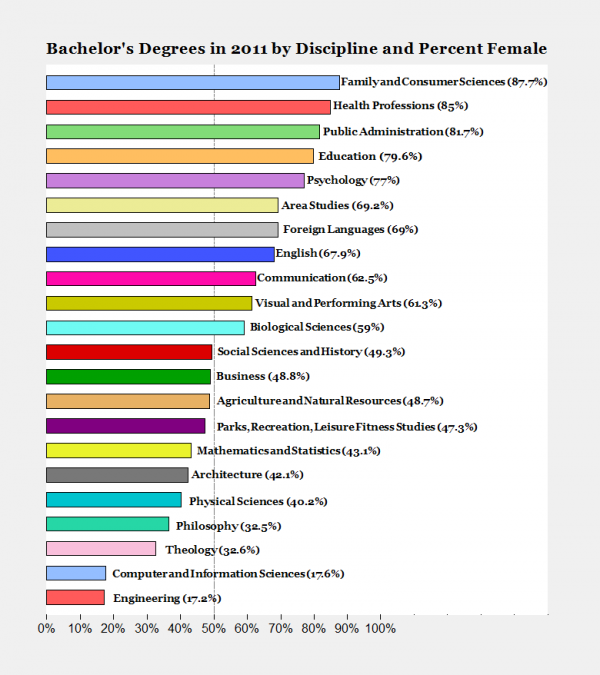By Mark Perry | The college class of 2011 by academic discipline and gender; and the selective concern about gender imbalances
The chart above is based on data from the Department of Education for bachelor’s degrees by academic discipline and the sex of the graduating students for the college class of 2011 (most recent year available). Here are some observations:
1. Although not displayed in the chart above, women earned 57.2% of all bachelor’s degrees granted in 2011, which also means that there were almost 134 women graduating with bachelor’s degrees in 2011 for every 100 men.
2. For the College Class of 2011, women significantly outnumbered men in 11 academic disciplines (top 11 bars above) and men outnumbered women in 11 academic fields (bottom 11 bars above).
3. For the most gender-unbalanced academic fields favoring women, 566 women graduated with bachelor’s degrees in health professions (primary registered nursing degrees) in 2011 for every 100 men; for public administration there were 446 female graduates for every 100 men; for education there were 391 women graduates for every 100 men and for psychology there were 334 women for every 100 men.
4. For the most gender-unbalanced academic fields favoring males, 481 men graduated in 2011 with a bachelor’s degree in engineering for every 100 female graduates, and 467 men earned a degree in computer science for every 100 women.
5. We hear all the time about female under-representation in STEM (science, technology, engineering and math) fields, but women actually outnumbered men for bachelor’s degrees in the STEM field of “Biological and Biomedical Sciences” by a ratio of 144 female graduates for every 100 males. Women also earned more than 43% of all bachelor’s degrees awarded in Mathematics and Statistics in 2011, and they earned more than 44% of the degrees in general mathematics (the most popular of the 12 sub-disciplines in math). For general chemistry (another STEM field), women earned nearly half (48.8%) of the bachelor’s degrees awarded in 2011.
6. Although not shown here, female over-representation in higher education gets even greater at the master’s level. In 2011, women earned more than 60% of the graduate degrees awarded, which means that there were almost 151 women earning master’s degrees in that year for every 100 men. Women also earned a majority (53.2%) of all doctoral degrees awarded in 2011.
MP: Maybe it’s perfectly natural to expect the gender differences by academic discipline that are represented in the chart above, and maybe we should give up trying to socially engineer perfect gender parity for each academic field. And when there is so much concern about female under-representation in some of the STEM fields like engineering and computer science, where is the concern about male under-representation in the STEM field of biology, where is the concern about the significant male under-representation in female-dominated fields like health professions, public administration, education and psychology, and where is the concern about the gender imbalance favoring women for college degrees in general at all levels – associate’s degrees, bachelor’s degrees, master’s degrees and doctoral degrees? As I have pointed out many times before on this blog, the concern about gender imbalances in higher education seems rather…. well, rather imbalanced and uni-directional.
For this third party post in its full context, please go to:



